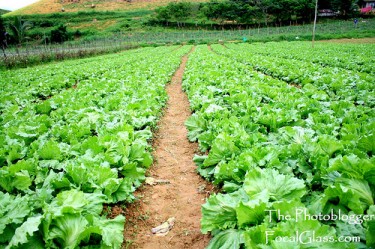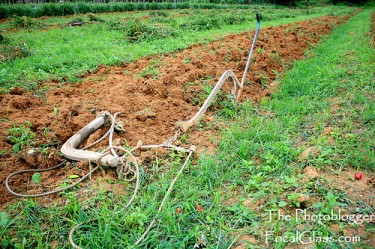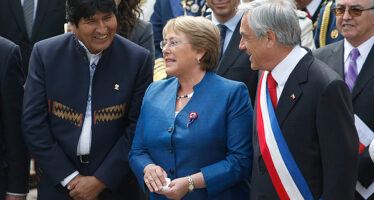Philippines: Bloggers’ Insights on the Peasant Problem
![]()
In the Philippine countryside, majority of peasants still suffer from ages-old feudal and usurious practices and rural underdevelopment as reflected in the lack of mechanization in the agricultural sector and deteriorated farm-to-market roads.
Last month, some Filipino bloggers joined a commercial tour to the mountainous parts of Cebu City in relation to the “Kumprahan Supermerkado,” a project by local business groups that aims to bridge the gap between peasants in the countryside and their affluent market in the city.
Aside from simply promoting and providing additional media projection to this project, the bloggers also got a small glimpse on the livelihood of the peasants of Sitio Cantipla, Tuanan, Cebu City. Crossroads, for instance, is fascinated by the thought of organic farming.
I kept on hearing the term “ORGANIC” while on our way and honestly, I had no idea what that word means as far as farming is concerned. When we were there, we were able to ask the farmers questions related to farming and stuffs. I was totally amazed with the place – lots of vegetables and root crops. The best part of that was the information I got.
Meeting with local vegetable farmers in Cantipla, Vernon Go frames the peasants’ problem in terms of the consumer-distributor relationship.
The problem… is that the product becomes too expensive after passing through “middlemen”. Even more disadvantageous is this model to the farmers which is why you come to wonder, “Why are farmers in the Philippines poor?” This whole new model of business is not really new, it has been adopted by other countries successfully, so why can’t we? Through the Kumprahan SuperMerkado, it will help the farmers progress and also encourage consumers to purchase fresh Organic Vegetables in Farm Gate prices.
McCoolot.com describes the site of the farm tour.
Some people call it the little Baguio of Cebu City. I couldn’t agree more – the place is cool even if it’s already noon, fresh air and relaxing place away from home. Abundant in vegetables and crops.
Image of farm implements from the Photoblogger.
And The Photoblogger comments on the poor state of the peasants’ means of production.
One of the things I did notice about the farms is the usual traditional methods of ploughing the fields. I come to wonder if the farmers can learn new methods to improve their production. Philippines is supposedly rich in Agricultural resources. I do hope that the government could put a little investment in improving the methods of farming.
After braving the dilapidated and winding roads to the area, Maria Eleanor Valeros of The Freeman found out that peasant leaders themselves shared the same sentiment.
[F]arm leader Aladin Pagatpat of the 50-member SUFALTRAS mentioned that if only they could be provided with four-wheel tractors to aid contour farming in rolling terrains and a cold chain facility that would store lettuce, baguio beans, tomatoes and atsal (bell pepper), then that would be the next big help to look forward to in line with empowering farmers and invigorating the countryside.
“Sa handling gyod problema. If a cold storage is available, that would help prolong the shell life most especially of lettuce,” he added.
Even after more than half a century of formal independence, the Philippines remain a backward and agricultural country whose industrial enclaves as well as communication and transportation infrastructure are largely the result of foreign capital investment that are geared towards serving foreign demand rather than national needs.
Efforts like “Kumprahan Supermerkado” can surely help improve the lives of selected peasant communities. But the resolution of the issue of genuine agrarian reform and rural development on a systemic and nationwide scale remains to be one of the longstanding aspirations of the Filipino people.
Related Articles
Bolivia – Chile: conclusión de las audiencias orales ante la Corte Internacional de Justicia
![]()
Este 28 de marzo, concluyeron en La Haya las audiencias orales entres Bolivia y Chile ante el juez internacional, relacionadas con la demanda interpuesta en el 2013 por Bolivia contra Chile. Iniciaron el 19 de marzo
Egyptians vote to elect new president
![]()
High turnout expected as 50 million people are eligible to vote in the country’s first democratic presidential electionAl Jazeera’s Sherine
El recorte de 65.000 millones agravará la recesión hasta 2013
![]()
Rajoy admite que el declive económico persistirá el año que vienAmanda Mars Madrid El ministro de Economía, Luis de Guindos,





